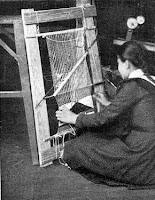Monday, September 19, 2011
Women and the Progressive Movement
I. Settlement House movement
A. Jane Addams and Hull House--Addams established Hull House with Ellen Gates Starr in 1889, and immediately attracted the attention of a large contingent of well-healed supporters and a great deal of favorable publicity.
1. Inspiration--Addams was inspired by her observations of what was happening at Toynbee Hall in the East End of London. There, young men from Oxford (often looking toward a career in the ministry) lived among the poorest of the poor in London, ministering to their needs.
2. Vision--Although Addams was inspired by the work at Toynbee Hall, she made important changes to the operation of the settlement house when she brought the idea to the near west side of Chicago.
a. Non-sectarian--Toynbee Hall was an arm of the Anglican Church, the established church of England. Many of the new immigrants living in the neighborhood around Hull House were Roman Catholic or Jewish, and the decision to remain unaffiliated with any religious body (although accepting help from all) made it seem less threatening to religious institutions in the neighborhood.
b. Democracy--Addams saw Hull House as an incubator for the democratic process, and therefore programming at Hull House was much freer than she had observed at Toynbee Hall. Although English language classes and the "classics" of English literature were available, neighbors were welcome to bring in their own cultural artifacts to supplement these materials.
3. Creating Public Space for Women--Addams graduated from the Rockford Seminary in 1881, but spent the next eight years floundering because she had no idea of how to make a career for herself outside of that fo housewife--which she had no interest in.
a. Death of her father--Addams' father was her source of self-confidence; when he died in the mid-summer of 1881, Jane Addams was left adrift.
b. The Family Claim--as the remaining unmarried female child in her family, Jane Addams was expected to be the companion of her step-mother until the step-mother's death.
c. Limited Female Public Role--the roles that middle class white women filled in American society was extremely limited at the beginning of the Progressive Era was extremely limited--school teachers, missionaries, lawyers, and doctors would make up most of a list of "respectable" occupations.
II. Municipal Housekeeping--During the Progressive Era, women began claiming the right to speak out and be heard in public as an extension of their duties in the home--a right claimed with the phrase "municipal housekeeping."
A. Settlement Houses--as discussed extensively above, this was a way for many women (and a few men) to reach out to recent immigrant groups--some more successfully than others.
B. Municipal politics--while women were restricted from participating in politics at the national level until passage of the 19th Amendment, women were active politically in a number of municipalities.
1. Toledo--Pauline Perlmutter Steinem--grandmother of feminist Gloria Steinem, Pauline Steinem was one of the earliest women to hold elective office in the state of Ohio when she was elected to the Toledo Public School Board in 1905.
2. Chicago--women also gained the right to vote in municipal elections in Chicago, in part because many had found a way to become politically active before being granted that right.
a. City Club of Chicago--a group of well-heeled, wealthy men roused to action as a result of the labor strife that had become endemic in Chicago (Great Upheaval of 1877, Haymarket Affair of 1886, Pullman Strike in 1894, among numerous other events). Organization formed in 1903, with the idea that citizens of a community should take responsibility for improving conditions in that community.
--The City Club of Chicago was an exclusive organization. Members had to be recommended by other members, and then prove through a written application that they adhered to the political ideology of the other members--which was very business-friendly.
--Resolution of issued tended to revolve around was Club members viewed as being most "cost-efficient"--that is, whatever result might return a profit or lower tax rates.
b. Women's City Club of Chicago--made up of many of the wives of the well-heeled, wealthy men of the Chicago City Club--but also a number of other women (including those involved in settlement work), and who had a more expansive and inclusive vision of what "betterment" of the community meant.
--Garbage disposal in Chicago: City Club called for the continuation of private contract for the disposal of garbage, since companies not only did it "efficiently," but through the process of "reduction" produced on oil used in the production of soap. The fact that citizens were inconvenienced by having to separate garbage from trash, that the rickety wagons that transported the garbage to the reduction plant leaked and spilled garbage along the route, and ran infrequently, were not persuasive arguments for making garbage pick-up and disposal a municipal function.
The Women's City Club of Chicago not only supported efforts to make garbage pick-up a municipal function, but also funded a study to ascertain whether the city should not instead operate an incinerator to dispose of both trash and garbage, and to use the ash left over to make paving bricks for the city streets.
C. Women's Christian Temperence Union (WCTU)--a quasi-political national organization that advocated the total banishment of the manufacture and sale of alcoholic beverages of any kind. Organization was formed as a result of the split formed in the women's suffrage movement. The WCTU's great moment of triumph was the passage of the 18th Amendment in 1919.
Subscribe to:
Post Comments (Atom)









No comments:
Post a Comment